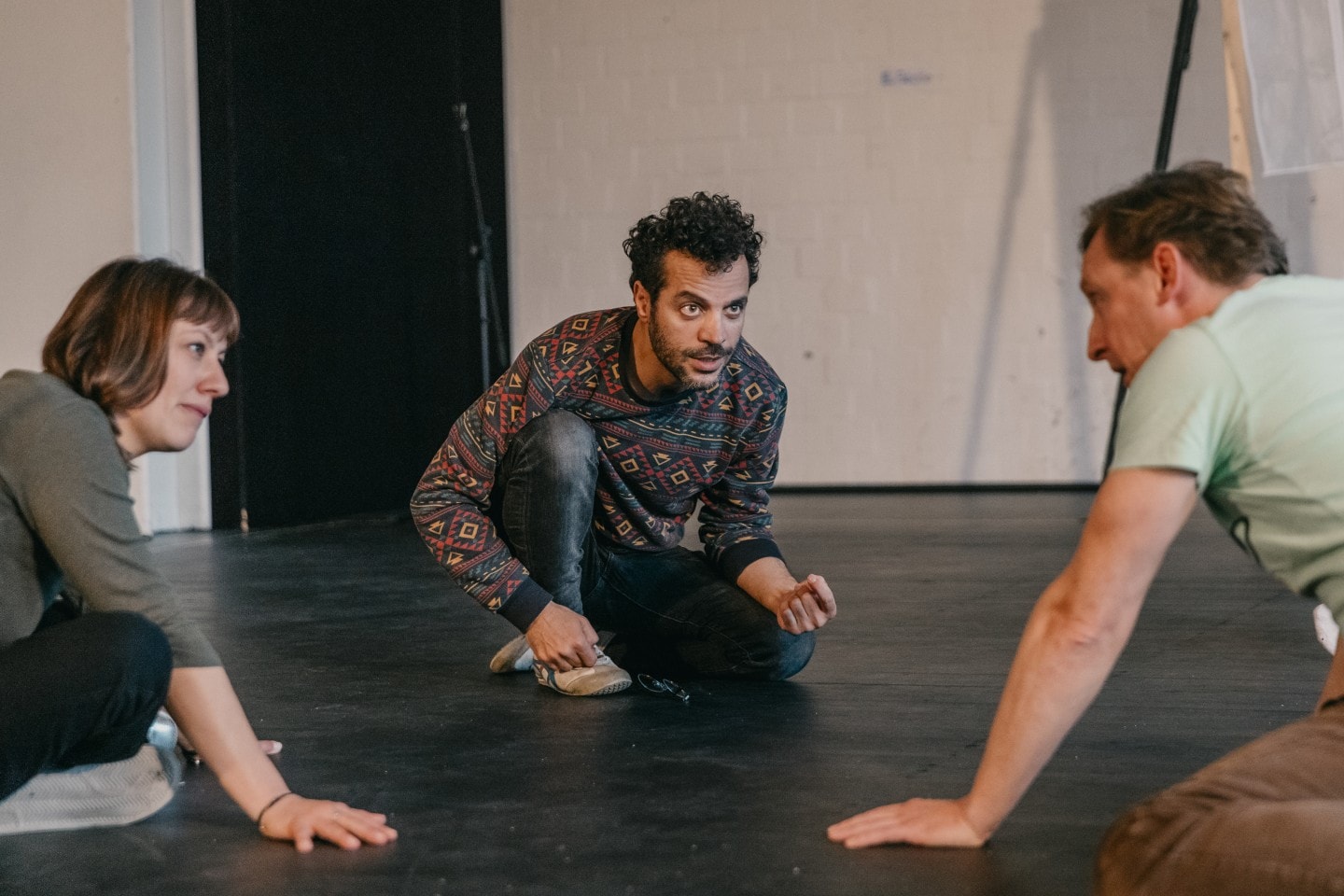WASHINGTON POST (14/1/2019)
When they hear shelling outside their apartment in Damascus, close to the front line, Rand and Hala start to laugh. They were just talking about artillery. “Rand called a bomb and it came immediately,” jokes Hala. “Call God,” she tells her friend. “But God won’t come,” she continues, as they keep laughing.
This could be a scene inside any home in the midst of the Syrian war. Instead, it is from “Your Love Is Fire,” a play by Syrian author Mudar Alhaggi, which was performed in theaters across Germany and at the Edinburgh Fringe Festival in 2017. It is the second play that Rafat Alzakout has directed since moving to Germany in 2015 after fleeing his native Syria and spending four years in Lebanon.
There is an Arabic proverb that says the worst tragedies are the ones that make you laugh. Alzakout is part of a flourishing community of Syrian artists in exile who are testing that notion. After eight years of conflict in Syria, at least half a million people have been killed and about 11 million have been forced to flee their homes. The war has devastated the country’s infrastructure and economy, plunging 80 percent of the population into poverty.
Today, President Bashar al-Assad has regained control of most of the country. In October, U.S. troops, who had been helping the Kurds maintain control over a section of northeast Syria, abruptly withdrew, paving the way for a Turkish military offensive — and triggering a fresh wave of mass displacement. Recently, Assad has been getting closer to seizing control of Idlib, the last rebel-held territory, causing the death and displacement of more civilians. There is, in short, no end in sight to the country’s tragedy. Which is precisely why, for some Syrians, the need for laughter is unlikely to fade.
Humor was a key feature of the 2011 uprisings that became known as the Arab Spring. Political satire took off as popular protests against authoritarian regimes spread across the Arab world. In Syria, for the first time in more than 40 years of dictatorial rule, protesters poured into the streets and dared to openly criticize and ridicule the regime.
“The dictator was like a god. He was untouchable, you couldn’t talk about him,” said Alzakout. In 2011, he joined forces with other theater professionals in Damascus and formed the collective Masasit Mati. They started a puppet show called “Top Goon” that satirized Assad. In short videos published on YouTube, the puppet Beeshu, a childish but brutal dictator, participates in a “Who Wants to Kill a Million” game show; appears dressed as Dracula trying to sink his fangs into a protester’s neck; and is advised by two devils who run away, scared by his plans to order the torture, rape and murder of protesters.
“We wanted to destroy the wall of fear,” explained Alzakout. After decades of censorship and silence, humor became liberating. But the risks of laughing at the regime were serious. In August 2011, Syria’s most famous cartoonist, Ali Ferzat, was severely beaten and left for dead on a road in Damascus after publishing a cartoon lampooning the president. The regime’s security forces smashed his hands as a punishment.
Masasit Mati’s 10 artists used puppets to protect their identities but still received warnings that they were wanted by Assad’s intelligence services. With the uprising escalating into a civil war, most of the collective’s members left Syria and scattered to different countries. After 35 episodes that were watched hundreds of thousands of times over a period of four years, “Top Goon” came to an end.
Among the most famous activists to use humor to draw international attention to Syria’s plight was Raed Fares, who inspired many with his messages of nonviolent resistance and his use of satire. His town, Kafranbel, became famous for its sharply worded protest banners. One, about the proxy war in Syria, read: “Black Friday special offer, whoever wherever you are, bring your enemy and come fight in Syria for free … limited time offer.”
“Laughter helped sustain the community living on the front lines,” said Syrian Palestinian activist and researcher Razan Ghazzawi, who co-founded Kafranbel’s women’s center. “Kafranbel’s community tried to belittle the atrocities of daily life with humor in order to survive.”
As the war escalated and brutality fueled radicalization, Fares faced not only the danger of regime bombings and shelling, but also threats from the Islamic State and other extremist groups that started to proliferate. In 2014, after he survived an attack by Islamic State-linked gunmen that left him with a punctured lung, he often joked that he didn’t really need two lungs because his nose was so big it could take in enough air.
(Photo by Felix von der Osten for The Washington Post )
